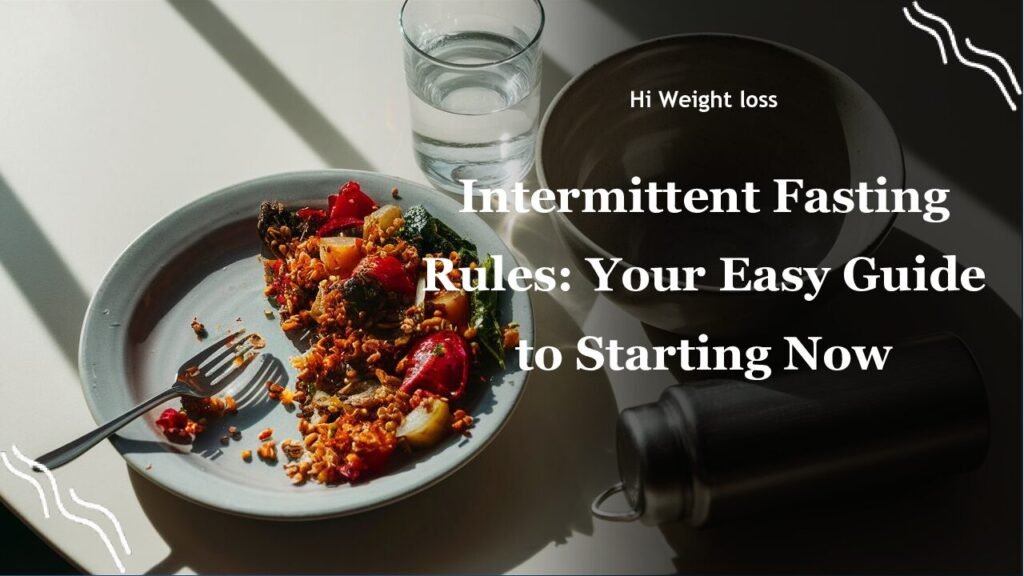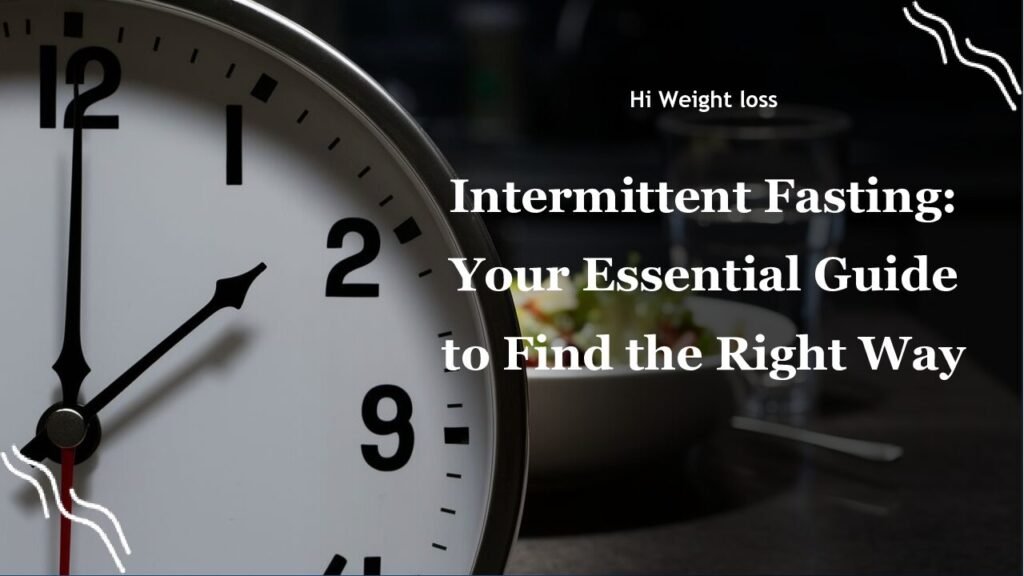“`
Struggling to lose weight and feeling overwhelmed by complicated diet plans? You might be curious about intermittent fasting and how much weight you can *realistically* expect to lose in a month. This article will explore the science behind intermittent fasting and provide realistic expectations for weight loss, including how much you can lose in a month, particularly if you’re a beginner, or how incorporating exercise can affect your results. Let’s dive in!
How Much Weight Can You Lose in a Month With Intermittent Fasting?
Understanding Intermittent Fasting and Weight Loss
Intermittent fasting (IF) isn’t about *what* you eat, but *when* you eat. It involves cycling between periods of eating and voluntary fasting on a regular schedule. Popular methods include the 16/8 method (16 hours fasting, 8 hours eating) or the 5:2 diet (eating normally for five days and restricting calories for two). My friend, Sarah, was skeptical at first, but she decided to try the 16/8 method and after a month, was very impressed by the positive changes she made. Her experiences are not unusual, and many people have been able to achieve this by using intermittent fasting to lose weight.
But how much weight can you actually lose? Research suggests that intermittent fasting can lead to a weight loss of approximately 4-8 pounds per month. These findings are supported by multiple studies, showing a consistent trend, although individual results may vary depending on factors like starting weight, diet, and activity levels. The key to success? Consistency. Harvard’s School of Public Health review of multiple studies highlights the potential for significant weight loss with this approach. So, it’s not a myth, and you can find credible research on how intermittent fasting can work.
Intermittent Fasting Weight Loss Results in 30 Days
Within 30 days of consistent intermittent fasting, many people notice a significant shift. As mentioned, you might be looking at a *weight loss* of 4-8 pounds, although some experience slightly higher or lower results. My cousin, Mike, started intermittent fasting while also trying to eat better. He found that the first two weeks were the hardest but then things became a lot easier. He lost 6 pounds in the first month, and a significant amount of inches around his waistline, too. It is encouraging to find such positive outcomes and it also makes the effort worthwhile.
Remember, your starting point matters. If you are overweight, you’re likely to lose more weight in the first month compared to someone who’s closer to their ideal weight. A review of 27 studies published by SimpleLife found that individuals can expect a weight loss ranging from 0.8% to 13% of their starting weight, further underscoring the variability depending on the person. How does that make you feel? Does this encourage you to explore intermittent fasting even more?

How Much Weight Can You Lose With Intermittent Fasting and Exercise?
Want to ramp up your weight loss? Combining intermittent fasting with regular exercise is a great idea. When you work out, you burn more calories and your body might be more effective at utilizing fat stores during your fasting periods. I’ve found personally that even just 30 minutes of walking or cycling can significantly increase the amount of weight that I can lose with intermittent fasting. According to research from the University of Illinois Chicago, intermittent fasting with exercise can result in an average weight loss of 3-8% of your baseline weight per month, and you can often find that the higher end of that spectrum is more achievable with consistent exercise.
Consider incorporating a mix of cardio (like running, swimming, or dancing) and strength training exercises (like weightlifting or bodyweight exercises). It’s important not to overdo it, especially when starting out. Start slow and gradually increase the intensity or duration as your body adjusts, and remember to listen to your body. You can’t expect huge changes overnight, but you will notice differences over time if you keep to a program. Are you ready to start integrating this into your weight loss program?
Intermittent Fasting For Beginners
If you are a beginner, the key to success is to start slowly and gradually ease into the practice of intermittent fasting. Consider starting with a 12-hour fasting period and gradually increase it to 14 or 16 hours as your body adapts. Remember to stay well-hydrated during your fasting periods with water or non-caloric beverages. A gradual introduction will give your body time to adjust to a new eating schedule, and this will make it easier for you to adopt a more long-term intermittent fasting approach.
Begin by choosing an IF method that works well with your lifestyle. The 16/8 method is very popular, but you can start with a 14/10 method if you feel like it is too hard at first. Also, don’t feel that you have to be too strict on yourself when you are starting out. You can be more flexible during the first two weeks so that you don’t feel too restricted, and it is much easier to follow this approach. The important thing is to find what works best for you. Do you think this is something you are willing to try?
Factors Affecting Your Weight Loss
Several factors can influence how much weight you might lose with intermittent fasting. These include:
- **Starting Weight:** People with a higher starting weight tend to lose more weight initially.
- **Diet Quality:** Consuming whole, unprocessed foods will lead to better results than eating processed foods.
- **Activity Level:** Combining intermittent fasting with regular exercise can significantly impact weight loss.
- **Consistency:** Sticking with your intermittent fasting schedule is important for achieving consistent results.
- **Genetics:** Individual genetics and metabolism also play a role in how the body responds to intermittent fasting.
It is important to keep in mind that weight loss is not a linear journey and that it is natural to expect some plateaus along the way. It is advisable to stay patient and focus on making consistent efforts. This means ensuring that you stick to your plan and continue to make changes that can improve your results, even if it means adjusting your approach slightly over time. What would you adjust if you hit a plateau?
| Scenario | Expected Weight Loss | Additional Notes |
|---|---|---|
| Intermittent Fasting Alone | 4-8 pounds | May vary based on diet and individual factors. |
| Intermittent Fasting + Exercise | Potentially 3-8% of baseline weight | Consistent exercise can enhance results. |
| Intermittent Fasting for Beginners | Varies, may need time to adjust | Gradual introduction to fasting is important. |
Conclusion
So, how much weight can you realistically expect to lose in a month with intermittent fasting? Research and personal experiences suggest that a *weight loss* of 4-8 pounds per month is a reasonable expectation. However, this is not a guarantee, and results may vary. Remember, factors like starting weight, diet quality, activity level, and consistency all play a significant role. My friend Sarah’s initial skepticism turned into positive outcomes as she discovered that intermittent fasting is a useful and very effective tool that helped her make the changes she wanted.
If you’re just starting out, take it slow, choose a method that fits your lifestyle, and don’t forget that consistency and a healthy diet can greatly enhance your efforts. Combining your program with some regular exercise is also likely to improve your outcomes. What are you waiting for? Are you ready to try out intermittent fasting and see how it works for you? Be sure to share your journey with us and ask questions that might improve your understanding.
FAQ
Is intermittent fasting safe?
For most healthy adults, intermittent fasting is generally safe. However, if you have any underlying health conditions, it is advisable to speak with your doctor before starting intermittent fasting.
Will I be hungry all the time?
Initially, you might experience some hunger, but this usually subsides as your body adjusts to the new eating schedule. Staying hydrated and eating nutrient-rich foods during your eating window can help.
Can I exercise while intermittent fasting?
Yes, it is recommended to incorporate exercise as a way to enhance the weight loss effects of intermittent fasting. It is best to exercise during the eating window so that your body has adequate fuel.
What are some common mistakes when starting intermittent fasting?
Some common mistakes include not staying hydrated, overeating during the eating window, and not being consistent with your fasting schedule. Be sure to take it gradually, and be consistent with your approach.
Can I do intermittent fasting long-term?
Yes, intermittent fasting can be a long-term lifestyle choice for many people. It is important that you continue to monitor your results, and be ready to make changes if necessary. Always consult with your doctor for a more personalized plan.
“`



